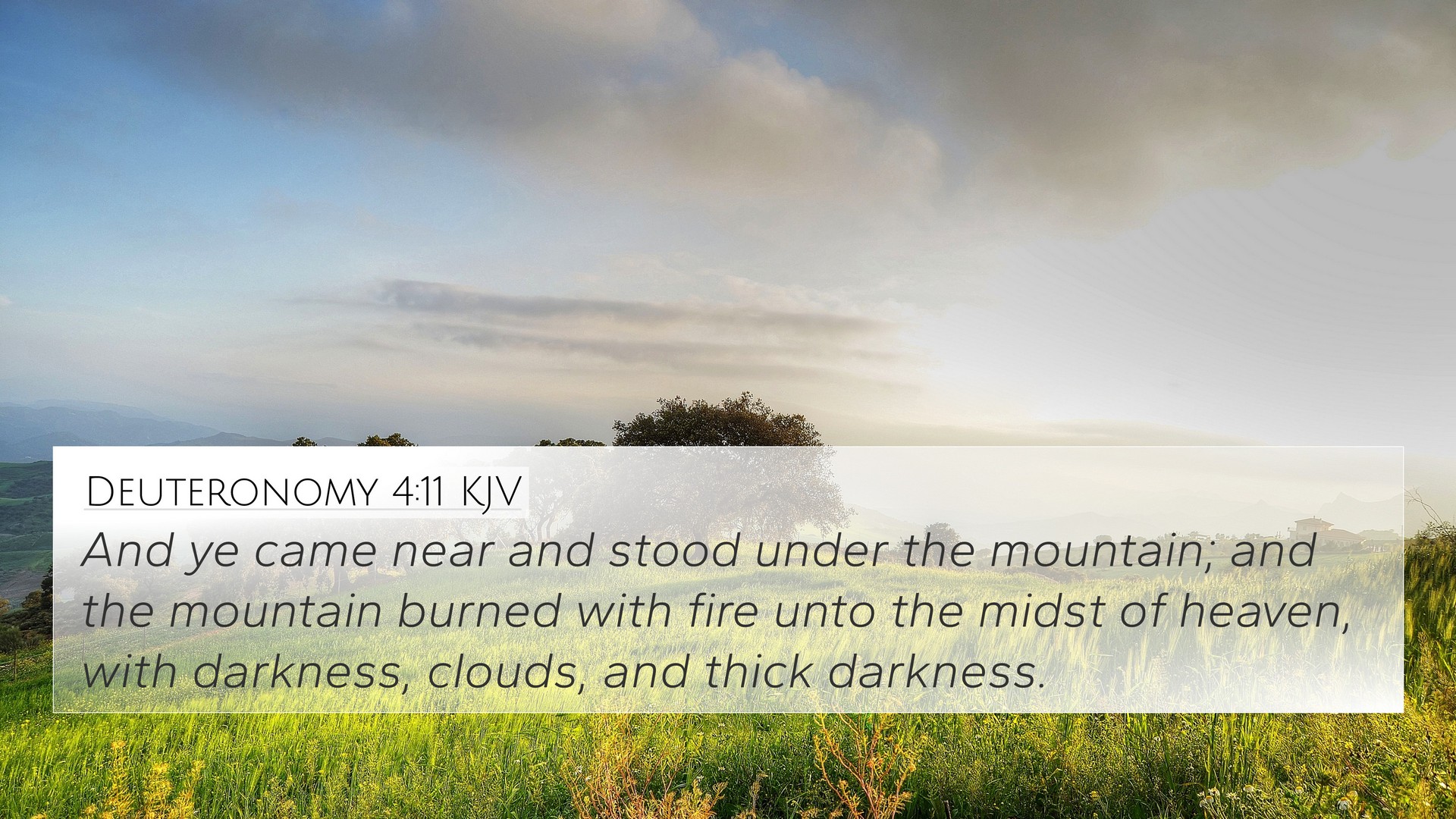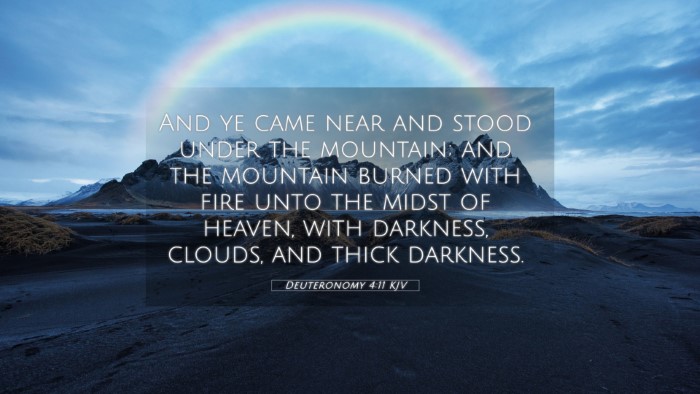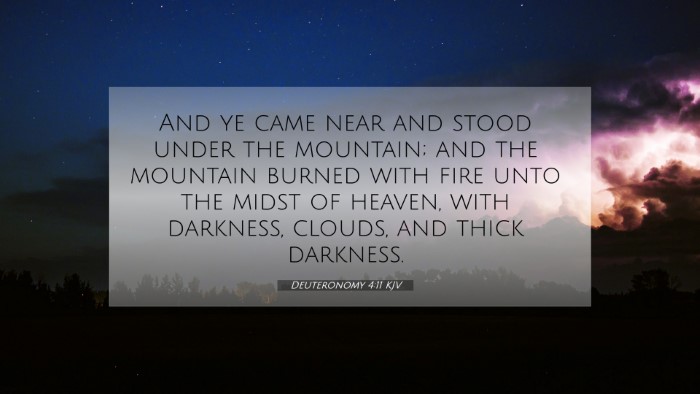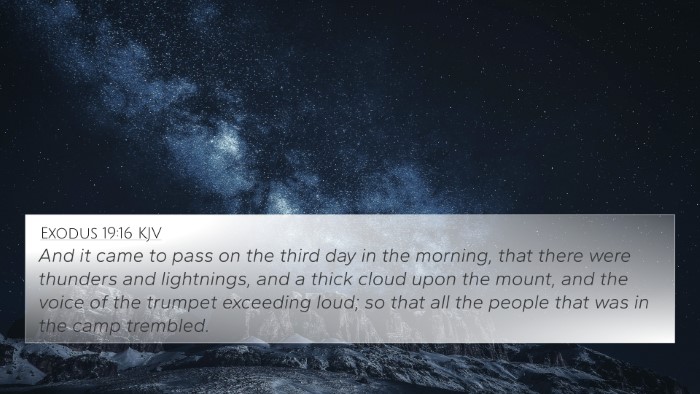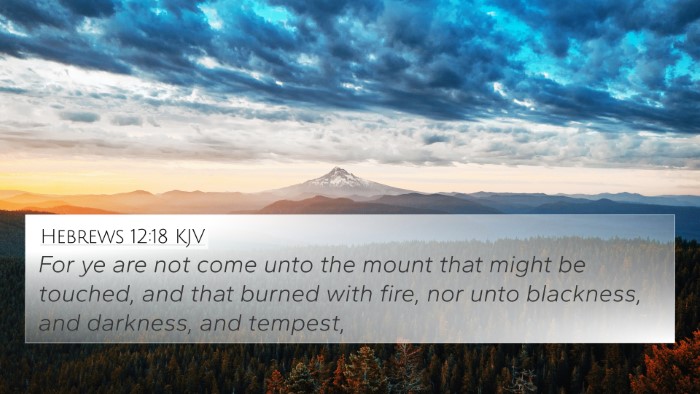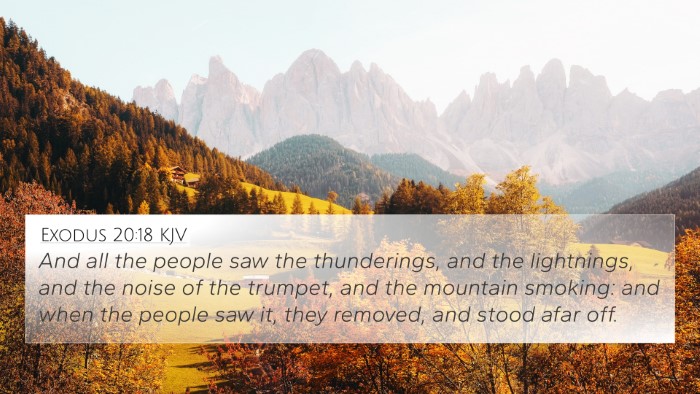Understanding Deuteronomy 4:11
Deuteronomy 4:11 states: “And ye came near and stood under the mountain; and the mountain burned with fire unto the midst of heaven, with darkness, clouds, and thick darkness.” This verse describes a profound moment in Israel’s history when the people of Israel encountered the mountain of Sinai, a pivotal site for the giving of the Law.
Verse Meaning and Analysis
This verse highlights the awe-inspiring and terrifying presence of God manifested on the mountain. By combining insights from several public domain commentaries, we can derive a richer understanding of its implications:
- Matthew Henry's Commentary: Henry emphasizes the divine nature of the experience, illustrating that God's appearance on Sinai was not merely a physical event but a spiritual encounter that underscored His holiness and supreme authority.
- Albert Barnes' Notes: Barnes points out that the “fire” represents God's judgment and purity. He explores the imagery of darkness and clouds, indicating the mystery and greatness of God's presence, which instills reverent fear in the hearts of the Israelites.
- Adam Clarke's Commentary: Clarke discusses the importance of the people's proximity to the mountain, noting that standing at the foot of Sinai gave them a unique perspective of God’s power and a reminder of the covenant they were expected to uphold. This proximity invokes a sense of responsibility and accountability.
Contextual Insights
The historical context is crucial to understanding Deuteronomy 4:11. This moment occurs as Moses recounts the Law to the Israelites, reinforcing their identity as God's chosen people. The frightening sights serve to prepare them for the seriousness of their covenant commitments.
Key Themes
- The Majesty of God: The imagery of fire, smoke, and darkness encapsulates the otherness of God, emphasizing that He is distinct and separate from humanity.
- Covenantal Reminders: The verse serves as a reminder of God's law and the relationship He has with His people, reinforcing the need for obedience and devotion.
- The Fear of the Lord: Israel's reaction to the mountain is indicative of the Biblical theme of fearing God, which is foundational for wisdom and understanding.
Bible Verse Cross-References
Connecting Deuteronomy 4:11 with other Scripture reveals profound truths and themes that recur throughout the Bible. Here are significant cross-references:
- Exodus 19:16-19: This passage recounts the same event of God descending on Sinai with similar dramatic imagery.
- Hebrews 12:18-21: The author of Hebrews reflects on the fearsome nature of God’s revelation at Sinai, drawing a parallel with the New Covenant.
- Isaiah 6:1-5: Isaiah’s vision of God's holiness echoes the themes of awe and fear associated with God’s presence.
- Psalms 68:7-8: This psalm describes God's powerful appearances and how they affect His people.
- Deuteronomy 5:22: This verse directly follows the Ten Commandments and emphasizes the people's reaction to God speaking out of the fire.
- Matthew 17:5: In the Transfiguration of Jesus, God's voice from the cloud parallels the divine revelation at Sinai.
- 1 Timothy 6:16: This verse speaks of God dwelling in unapproachable light, further emphasizing His holiness.
- Revelation 4:5: The description of God’s throne and surroundings reinforces the biblical imagery of divine majesty.
- Joel 2:30-31: The prophets often reflect on God’s majestic power, linking back to themes present at Sinai.
- Romans 1:20: The awareness of God's attributes through creation points back to the reverence that is due to Him as seen at Sinai.
Thematic Bible Verse Connections
The themes surrounding Deuteronomy 4:11 find resonance in various scriptures, aiding in the understanding of God's character and expectations:
- Fear and Awe of God: Psalms 89:7 speaks of God being greatly feared in the assembly of the saints, linking the concept of divine respect.
- God's Holiness: Isaiah 33:14 describes sinners in Zion being afraid due to God’s holiness, emphasizing the dangers of being in His presence unprepared.
- Sacred Encounters: Exodus 3:5, where Moses is instructed to remove his sandals, demonstrates the sacredness of approaching God.
Tools for Bible Cross-Referencing
For those studying Deuteronomy 4:11 and desiring deeper insights through cross-referencing, the following tools are recommended:
- Bible Concordance: Use a concordance to find related words and themes across different scriptures.
- Bible Cross-Reference Guide: These guides provide extensive lists of verses that connect doctrinally or thematically.
- Bible Study Software: Numerous programs facilitate comprehensive searches for verses and themes, fostering an enriched study experience.
- Online Bible Resources: Various platforms allow for easy access to annotations, commentaries, and cross-reference capabilities.
Conclusion
Deuteronomy 4:11 serves as a crucial verse in understanding the relationship between God and His people, as well as the overarching narrative of scripture that emphasizes God’s holiness, the importance of reverence, and the seriousness of His commandments. As readers engage with this text and explore its cross-references, they are invited to reflect on the implications of encountering the divine and the call to live in accordance with His will.
